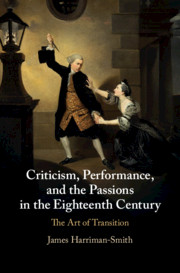Book contents
- Criticism, Performance, and the Passions in the Eighteenth Century
- Criticism, Performance, and the Passions in the Eighteenth Century
- Copyright page
- Dedication
- Contents
- Illustrations
- Acknowledgements
- Note on Style
- Introduction
- Chapter 1 Dramatic Transition
- Chapter 2 Zara
- Chapter 3 Odes
- Chapter 4 King Lear
- Chapter 5 Dramatic Character
- Coda
- Notes
- Bibliography
- Index
Chapter 1 - Dramatic Transition
Published online by Cambridge University Press: 02 March 2021
- Criticism, Performance, and the Passions in the Eighteenth Century
- Criticism, Performance, and the Passions in the Eighteenth Century
- Copyright page
- Dedication
- Contents
- Illustrations
- Acknowledgements
- Note on Style
- Introduction
- Chapter 1 Dramatic Transition
- Chapter 2 Zara
- Chapter 3 Odes
- Chapter 4 King Lear
- Chapter 5 Dramatic Character
- Coda
- Notes
- Bibliography
- Index
Summary
This chapter reveals the elaboration of a set of critical priorities, transition prime among them, crystallised by Aaron Hill in the 1730s. Offering what he claimed to be a purified version of pantomime’s techniques for arresting attention, Hill wrote of how actors could become a ‘true FAUSTUS’ for the theatres through transition, creating iconic and dynamic moments of suspension during which they could shift mind and body from one passion to another. Hill’s emphases continue into the time of David Garrick, whose transitions into ‘pensively preparatory attitudes’ were praised as intellectual achievements and blamed as pantomimical tricks. Ultimately, pauses and the transitions that occurred upon them became moments when an actor could be described as asserting their artistic autonomy and the focal point of critical attention. The realisation of Hill’s dreams — a theatre where sophisticated emotion replaced slapstick motion as the key source of spectacle — soon, however, risked becoming a Faustian pact, for an insight into the transitions of a play seemed to demand as much private attention to the page as public engagement with the stage.
- Type
- Chapter
- Information
- Criticism, Performance, and the Passions in the Eighteenth CenturyThe Art of Transition, pp. 22 - 54Publisher: Cambridge University PressPrint publication year: 2021

